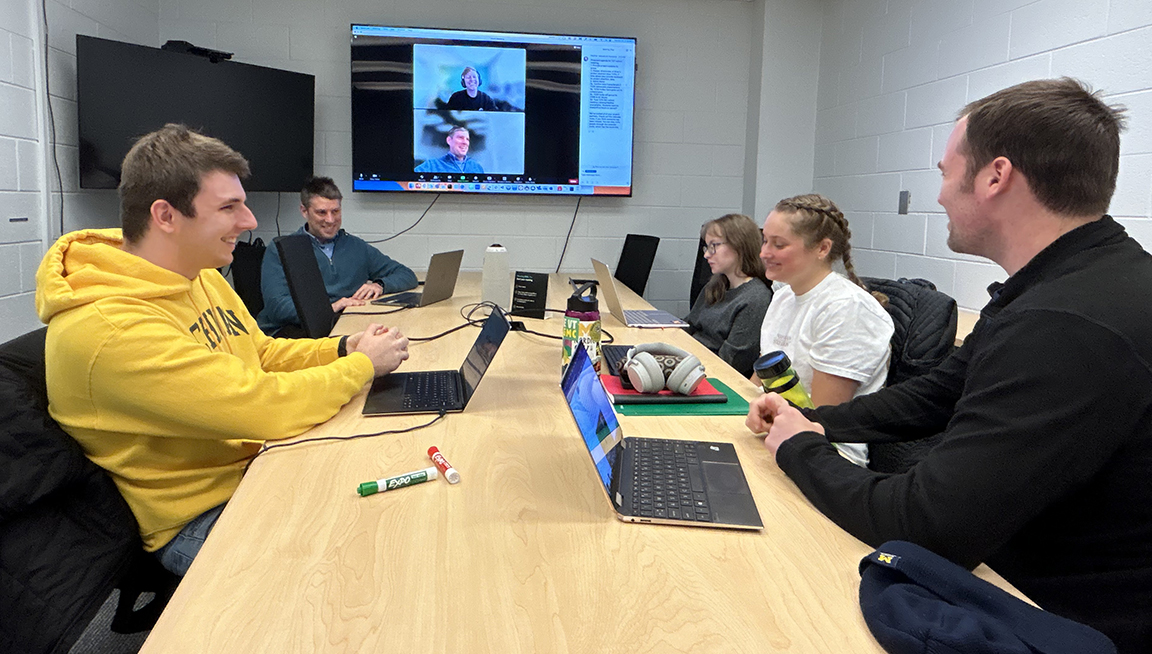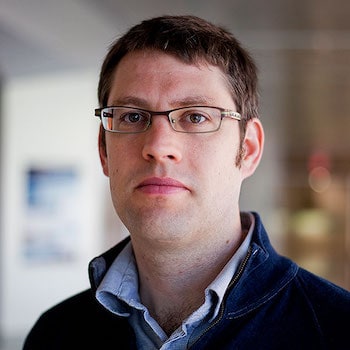
Master’s Degree Preparing Students to Work in Climate Solutions Gets a Refresh
As we prepare for updates to the Master’s of Engineering program in the climate sciences, we spoke with Professor Jeremy Bassis about the exciting changes ahead.

As we prepare for updates to the Master’s of Engineering program in the climate sciences, we spoke with Professor Jeremy Bassis about the exciting changes ahead.
Article by Melissa F. Priebe and Heather Vaquera
As the climate crisis leads to increased extreme weather events and natural disasters worldwide, the need to help communities plan for the impacts and consequences of climate change is becoming increasingly urgent. The demand for qualified professionals who can assess current and future climate impacts and identify realistic solutions is growing rapidly.
The challenges of a changing climate are upon us. Heat waves, severe weather, air quality issues, catastrophic flooding, and changes in weather-driven economies are just a few of the threats facing people and their communities. These issues affect people everywhere, as well as the companies, organizations, and governments working to provide goods and services despite the disruptions brought on by weather and the climate.

In the University of Michigan’s Department of Climate and Space, one master’s degree program is answering this need. The Master’s of Engineering in Climate Impacts and Solutions offers students a unique path to become advocates, pioneers, or change-makers in the field of climate sciences, with the training in data analysis and engineering needed to develop real solutions.
This fall, the program will be renamed to better represent its educational goals, and the curriculum will get a refresh, pending a formal approval process. The updates to the program are in the final stages of the approval process by the state and the University of Michigan provost office, and they are slated to become effective in the 2025-26 Academic Year.
As we prepare for these updates, we sat down with Professor Jeremy Bassis, Ph.D., who has served as the program director for the M.Eng. program, to discuss the degree, what it has to offer, and why it is changing its name.
Q. What led to the name change for the Master’s in Engineering program? Could you tell us more about what it represents?
“Originally, the program was called Applied Climate. The name made sense because our students learned how to apply climate knowledge to problems of societal relevance. However, we realized that students from outside of our department didn’t understand what they would gain from a Master’s of Engineering program in Applied Climate. The new name, Climate Impacts and Solutions, better emphasizes to students and employers that our students learn about the impacts of climate change and, crucially, working with partners to develop local solutions.“
Q. Who would make a good candidate for this program?
“Students with physical science and engineering backgrounds that are interested in working at the intersection between climate and society are ideal candidates for our program. Although our curriculum includes physical science components, such as understanding the climate system, it also has a strong emphasis on engineering and design, as well as some elements of social science. Climate change–and particularly the realm of climate solutions–doesn’t fit neatly into any single discipline. Therefore, our students learn to think about systems on a broader, more interdisciplinary level, integrating knowledge across various fields.“
Q. What is the biggest change to the program and how will it impact students?
“Aside from the name change, the biggest change to our program is that we have changed the requirements to allow all students to finish the program in two semesters. In the past, external students needed three semesters to complete all program requirements. This change will make the program more accessible to a broader range of students. The strength of the program remains intact. A core component of our students’ experience is still the practicum, where students gain real-world experience working with partners.“
Q. Will the revamped program be more flexible when it comes to the curriculum and core courses?
“Our core focus is still on climate fundamentals, geographical information systems, and statistics. However, we have also redesigned the program to make the curriculum more flexible. This change better positions our students to take advantage of the many new classes and opportunities that are available at the University of Michigan.“
Q. Do students in this program have the opportunity to choose the topic they research for their practicum? What if they come to the program with a specific idea, their own initiative, and an entrepreneurial spirit?
“One of the strengths of our small program is the flexibility we offer students. We can tailor practicum projects to align with students’ interests. If students come into the program with a specific idea, we can try to support them in pursuing studies on that topic or issue. Many of our students are interested in climate justice and the impact of climate policies on historically marginalized communities. We actively try to support and build projects to include social justice components. Additionally, given the two semester timeline, we aim to develop projects before students arrive, so that they can hit the ground running as soon as they enter the program.“
Q. What motivates students in your program to go beyond getting a bachelor’s degree? Could you share a few examples of why students choose this program?
“Students often choose our program because they care deeply about the climate crisis. They want to take action and do meaningful work in climate-related fields. Many of our students don’t want to pursue a Ph.D., and yet, they recognize that a four-year undergraduate degree doesn’t fully prepare them for these fields.
“Our graduates are prepared to make a measurable difference and curb the impact of climate issues, using a cross-section of skills in data analysis, quantitative programming, GIS Mapping, and spatial geography, on top of their understanding of our fragile climate.
“Those who hire our graduates are not limited to a single industry, and instead our alumni have gone on to work in a variety of positions, including consulting roles and jobs at the United Nations.”
Q. Do students need to get a doctorate if they earn a master’s in this program?
“Students don’t need to get a Ph.D. Our M.Eng. program is designed to serve as a standalone degree.
“The M.Eng. is designed to be a terminal degree program, and it prepares you for rewarding careers in a diverse segment of climate-related fields. While some of our students do go on to earn their Ph.D., this program is less focused on preparing you to be a professor in higher education and more focused on securing work in climate agencies, industries or NGOs, where the work is focused on measurable impact.“
Q. Can students make a meaningful impact on climate change and climate-related issues within or using the Applied Climate education? Can you give some possible scenarios or scenarios?
“We believe students can make a meaningful impact. The reality is that most climate-related decisions are going to be made at the local community level. However, many local communities and organizations lack the climate expertise needed to interpret climate information. Our students often fill this gap, helping to interpret climate information so that it can be applied to actionable decisions.
“In recent history, our students have prescribed the amount of change needed to realistically achieve climate policy goals, developed scaleable ideas to protect orchards from changing frost patterns, explored the root causes of preventable flooding disasters, and identified the climate factors that negatively affect marginalized groups.
“With attention to social justice, our invaluable natural resources, and the ever-evolving climate crisis, the M.Eng. in Climate Impact and Solutions offers motivated and entrepreneurial-minded students a path to securing the climate jobs of the future.”
The Master’s in Engineering in Climate Impacts and Solutions degree program (previously named the M.Eng. in Applied Climate) is open to students with a bachelor’s degree who are accepted to study at the University of Michigan College of Engineering. Pending final approval, the new program name and the program changes will be implemented at the beginning of the 2025-26 Academic Year, in time for the Fall Semester.
We welcome ideas and suggestions on how to continue to improve the program. Feel free to email us.
For more information about enrolling at the University of Michigan, visit: https://umich.edu/prospective-students/